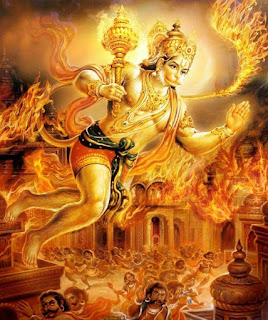09:00 on Tuesday, the 9th: Sugriva and I left Kishkindha this morning. Equipped with the finest weapons and a week's worth of provisions, I hope to find and slaughter this monster soon.
18:00 on Tuesday, the 9th: While we have not yet found the monster that has been terrorizing Kishkindha, we have followed its path of destruction through the forest. Trees have been completely ripped from the ground. Enormous scratch marks score the ground. Even a straight narrow creek I've seen numerous times before now bends as though it were injured by the beast! As the sun sets, I pray that monster does not devour Sugriva and myself in our sleep.
10:00 on Wednesday, the 10th: Sugriva and I have tracked the beast to a series of underground tunnels. Because my boon should afford me additional protection from the fiend, we have decided Sugriva will stand guard outside the tunnel while I venture inside. Thus, should I die during my feat of heroism, Sugriva may retrieve my body for a proper treatment before returning for reinforcements. I now plan to venture inside this musty tunnel in defense of my city.
This is the entrance of the tunnel Vali is venturing into
---The evening of the 10th: Vali has not yet returned from the tunnels. He has been gone for some time. I have heard the roaring of the beast inside the tunnel. While I have not yet heard Vali's voice, I am beginning to worry.
Midnight of the 10th: With the moon high in the night sky, I can only see by the light of the moon. A sticky and warm fluid has begun to flow from the tunnel. I believe this fluid to be blood. I have no way of knowing whether this blood belongs to Vali or the beast, but I am beginning to worry my brother may not return. I did not know this network of tunnels was so vast.
Sunrise on the 11th: After a few short hours of sleep, I awoke to the rising sun. I can now confirm that blood has pooled at the entrance to the tunnels. I pray that my lapse in consciousness did not lead to my brother's death. I cannot imagine telling Tara, the woman I love, that her husband has died. Perhaps I could help her through her grief? Should Vali not return before noon, I will assume he has died.
Noon on the 11th: Without Vali in sight, I feel that I have no choice but to assume Vali has died. Surely battling the beast did not require more than a full day from the greatest warrior in the kingdom. If the beast could defeat Vali, I fear that no man will ever best the beast. Rather than waste hundreds if not thousands of good men, I realize that I have but one choice- I must leave my brother in the tunnels so I can trap the beast for good. I look at the blood in the tunnel's entrance. Surely, Vali has died. Knowing the size and strength of the beast to be impressive, I grab an entire mountain from the neighboring region. I shove the mountain deep into the tunnel, ensuring nothing can ever escape. At that moment, I realize I must rule in my brother's stead because whether by the beast or my hand, Vali is now surely dead. It is certainly a good thing that Sugriva, King of Kishkindha, has a certain ring to it. It is a name I expect people to hear for years to come.
---
Author's Note: This story was inspired by my project and the story of Vali and Sugriva. From information I could find, the story goes that the two brothers were together hunting a great monster. Vali followed the monster into underground tunnels while Sugriva stood guard at the mouth of the tunnel. When blood came dripping out of the tunnel and Vali failed to answer Sugriva's calls, Sugriva blocked the mouth of the tunnel with a mountain, ensuring that nothing could escape the tunnels- including Vali. The blood was that of the monster Vali had killed. Sugriva had trapped his beloved brother and returned to Kishkindha to claim Vali's crown and wife.












